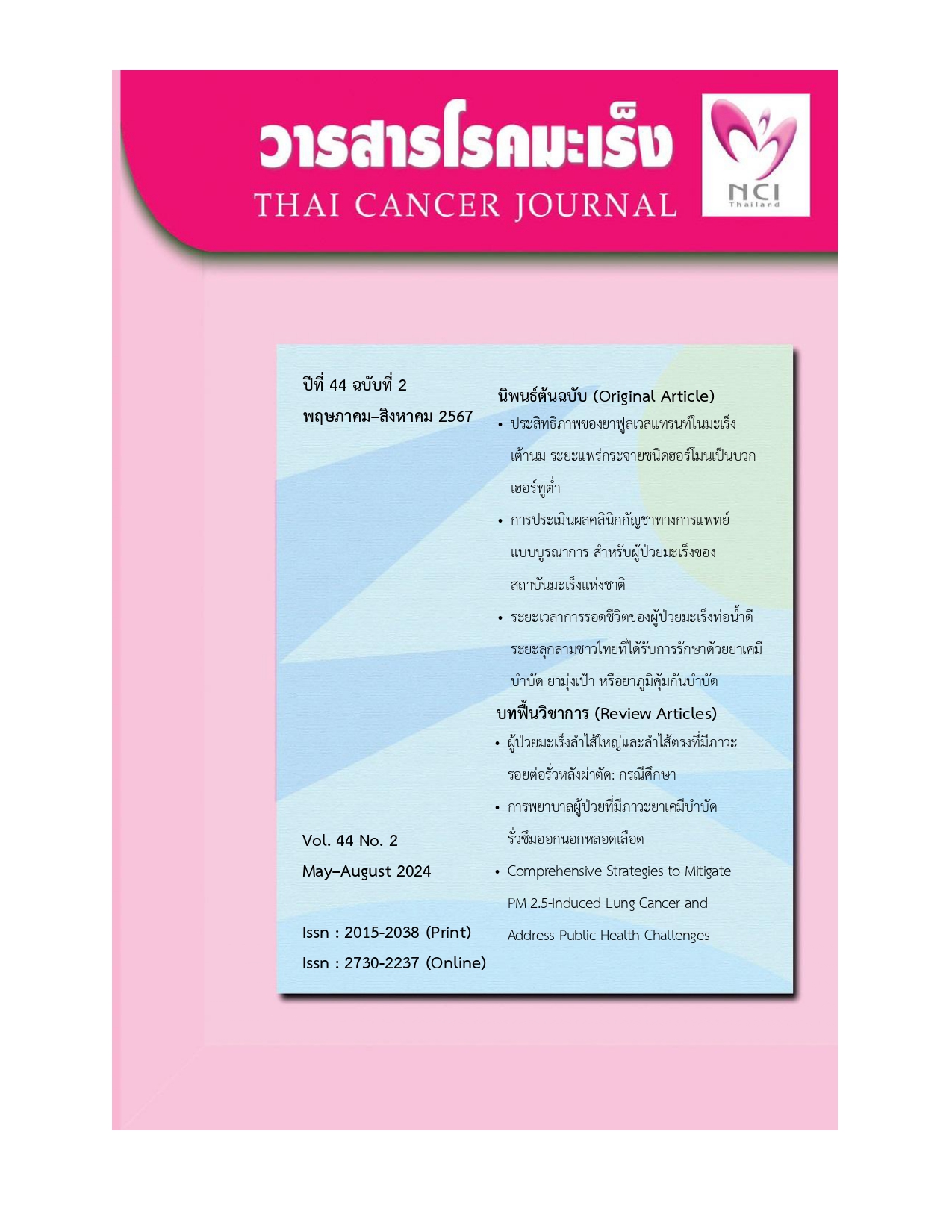Survival of Thai Metastasis Cholangiocarcinoma Patients Treated with Chemotherapy, Targeted Therapy or Immunotherapy
Keywords:
advanced cholangiocarcinoma, overall survival, progression-free survival, adverse eventsAbstract
Cholangiocarcinoma is a type of cancer which incidence and mortality worldwide are increasing every year. The world’s highest incidence of bile duct cancer is found in Thailand. Chemotherapy is the primary treatment choice at the moment. The first line treatment is the cisplatin/gemcitabine combination. Additionally, targeted therapy may be used. However, there is a lack of information regarding the efficacy and safety of chemotherapy, targeted therapy or immunotherapy in Thai patients with advanced cholangiocarcinoma. The purpose of the research was to study the effectiveness and safety of using chemotherapy and/or targeted drugs in the treatment of advanced cholangiocarcinoma in Thai patients. This is a descriptive retrospective study that collected data from medical records of patients at King Chulalongkorn Memorial Hospital, from January 1, 2015, to December 31, 2021. Sixty seven patients met the eligible criteria, most patients were male (62.69) with an average age of 63.07±9.30 years. For effectiveness, the median progression-free survival was 9 months (95% CI, 6.7-11.2), and the median overall survival was 14 months (95% CI, 11.0-16.9). Adverse events for cisplatin/gemcitabine were reported in 57 out of 59 patients, and the most common adverse events were nausea/vomiting in 57 cases (99.6, constipation in 39 cases (66.1%), and diarrhea in 33 cases (55.9%). The median overall survival of cholangiocarcinoma patients receiving chemotherapy and/or targeted therapy was higher when compared to previous studies. The median progression-free survival was comparable. However, Thai patients experienced more adverse events.
References
Banales JM, Marin JJG, Lamarca A, Rodrigues PM, Khan SA, Roberts LR, et al. Cholangiocarcinoma 2020: the next horizon in mechanisms and management. Nat Rev Gastroenterol Hepatol. 2020;17:557-88.
สถาบันมะเร็งแห่งชาติ. ทะเบียนมะเร็งระดับโรงพยาบาล พ.ศ.2563 [อินเทอร์เน็ต]. 2563 [เข้าถึงเมื่อ 26 พฤษภาคม 2567]. เข้าถึงได้จาก: https://www.nci.go.the_book/hosbased_2563/ files/main.pdf.
สถาบันมะเร็งแห่งชาติ. แนวทางการตรวจคัดกรองวินิจฉัยโรคมะเร็งตับและท่อน้ำดี 2011 [อินเทอร์เน็ต]. 2554. [เข้าถึงเมื่อ 26 พฤษภาคม 2567]. เข้าถึงได้จาก: https://www.nci. go.th/th/cpg/download %20Liver/01.pdf.
Weigt J, Malfertheiner P. Cisplatin plus gemcitabine versus gemcitabine for biliary tract cancer. Expert Rev Gastroenterol Hepatol. 2010;4:395-7.
Malka D, Cervera P, Foulon S, Trarbach T, de la Fouchardière C, Boucher E, et al. Gemcitabine and oxaliplatin with or without cetuximab in advanced biliary-tract cancer (BINGO): a randomized, open-label, non-comparative phase 2 trial. Lancet Oncol. 2014;15:819-28.
Okusaka T, Nakachi K, Fukutomi A, Mizuno N, Ohkawa S, Funakoshi A, et al. Gemcitabine alone or in combination with cisplatin in patients with biliary tract cancer: a comparative multicentre study in Japan. Br J Cancer. 2010;103:469-74.
Li-Tzong C, Jen-Shi C, Yee C, Chang-Sung T, Yan-Shen S, Chiun H, et al. KRAS mutation status-stratified randomized phase II trial of GEMOX with and without cetuximab in advanced biliary tract cancer (ABTC): The TCOG T1210 trial. Available from: http://www. https://ascopubs.org/doi/10.1200/jco.2013.31.15_suppl.4018. Accessed May 26, 2024.
Valle J, Wasan H, Palmer DH, Cunningham D, Anthoney A, Maraveyas A, et al. Cisplatin plus Gemcitabine versus Gemcitabine for Biliary Tract Cancer. New England Journal of Medicine. 2010;362:1273-81.
Downloads
Published
Issue
Section
License

This work is licensed under a Creative Commons Attribution-NonCommercial-NoDerivatives 4.0 International License.
บทความทีตีพิมพ์ในวารสารโรคมะเร็งนี้ถือว่าเป็นลิขสิทธิ์ของมูลนิธิสถาบันมะเร็งแห่งชาติ และผลงานวิชาการหรือวิจัยของคณะผู้เขียน ไม่ใช่ความคิดเห็นของบรรณาธิการหรือผู้จัดทํา







